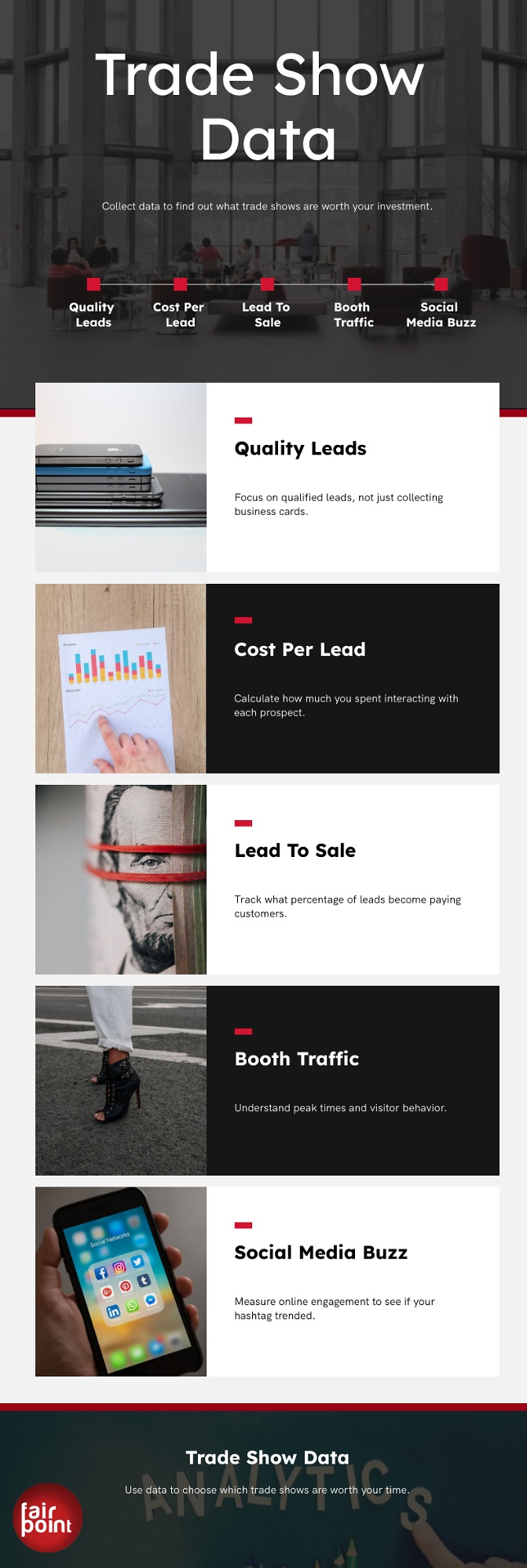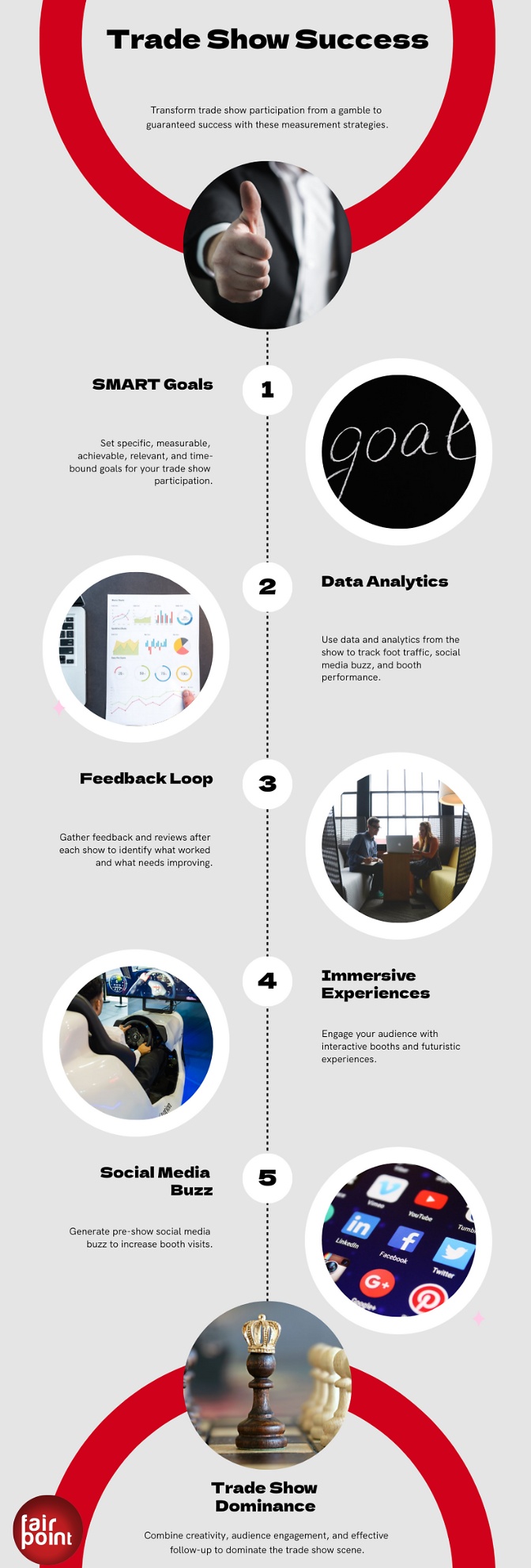
Let's face it: Simply attending a B2B expo won't cut it. You need a strategy to excel and maximize your return on investment (ROI). This guide is not just another resource, it's your secret weapon to unlock the true value of trade shows.
Are you tired of wondering if your efforts paid off? This guide will provide the reassurance you need, showing you how to measure the real impact of your participation. You'll learn how to capture high-quality leads that turn into happy customers and discover strategies to create a lasting impression that keeps your brand top-of-mind. We'll reveal the key data points to analyze and understand your trade show success, giving you the confidence to know you're on the right track.
Get ready to transform your trade show approach. So, ditch the guesswork and prepare to dominate the expo floor with a new level of motivation.
B2B Trade Shows: Level Up Your Marketing Game
Forget flashy booths and free pens – B2B trade shows are about domination. They're your chance to forge connections, showcase your brand, and land high-quality leads.
Why are trade shows a battleground?
- Networking Nirvana - Trade shows are a goldmine for building relationships and sparking new partnerships. Every handshake is a potential game-changer.
- Visibility Victories - Get your brand out there! Trade shows are a launchpad for boosting brand awareness and staying top-of-mind.
But wait, there's more!
The trade show landscape is evolving. We're talking virtual reality product demos, live social media engagement, and killer apps that enhance the in-person experience. This hybrid approach is redefining B2B success.
So, how do you win in this new arena?
- Shine Brighter Than the Competition - Stand out from the crowd with innovative booth ideas and engaging presentations.
- Forge Genuine Bonds - Don't just collect business cards. Build real connections and relationships with potential partners.
- Embrace the Hybrid Approach - Leverage technology to enhance the in-person experience and create a lasting impact. The trade show world is dynamic, so adapt, connect, and surpass the competition.
Why Is Trade Show Data Important
Think of your marketing channels—you would only throw money at them if you tracked results, would you? You likely analyze every dollar spent to maximize return on investment (ROI). So why not apply the same approach to trade shows?
Trade shows can be powerful revenue generators, but only if you track the data. This data provides concrete proof of your trade show success. By measuring things like leads generated, conversion rates, and ROI, you can identify areas for improvement. It empowers you to make intelligent decisions about which trade shows are worth your investment.
Here are some key metrics (KPIs) to track at trade shows

Key Metrics on How to Measure Trade Show Effectiveness
Sure, a packed booth is exciting, but true success lies in the data – the cold, hard facts that reveal your trade show ROI. Ditch the post-show guesswork and dive into these essential metrics to measure your B2B expo dominance:
Quality Leads, Not Just Quantity - Collecting business cards is excellent, but qualifying those leads is gold. Focus on genuine interest, not just freebies. A quality conversation can be worth more than a stack of indifferent handshakes. Learn more about the right way of making your expo pitch
Cost Per Lead - Friend or Foe? Time to crunch some numbers! Divide your trade show expenses by the number of solid leads you snagged. It reveals if those interactions were golden opportunities or just pricey distractions.
Lead to Sales Conversion - The Ultimate Test This metric is the heart of your strategy. It shows how effectively you're turning interested prospects into paying customers.
Booth Traffic - Quality Counts It's not just about the number of visitors but how engaged they were. Track foot traffic to understand peak times and visitor behavior.
Social Media Buzz - Did Your Hashtag Take Off? Don't underestimate the power of online engagement! A trending hashtag or buzzworthy content can amplify your reach beyond the convention center.
Brand Awareness - This one's a bit trickier to measure but crucial nonetheless. Did your brand recognition increase after the show? Do people see you in a positive light?
Win Rate & Meetings that Close Deals - This metric assesses the success of your trade show meetings. Did your conversations lead to deals or just friendly chit-chat? It connects your effort, investment, and the real business opportunities gained.
Tracking these key metrics can transform your trade show participation from a gamble to a strategic win. This guide will equip you with the tools to analyze your data and refine your approach for future expos, ensuring you dominate the show floor and convert those leads into sales!
Metrics for In-Depth Analysis
Understanding the key metrics is crucial, so let's delve deeper into them – the good, the bad, and the data-driven! Think of it as peeling a complex onion: the more layers you uncover, the more profound the insights (and perhaps a few tears, but that's the path to success!)
Metrics That Matter Most:
Cost Per Qualified Lead (CPQL) - Not all leads are created equal. This metric helps you identify the genuinely interested prospects – the ones ready to move from handshakes to deals. It's about quality over quantity, separating the gold from the glitter.
Return on Investment (ROI) - The ultimate ROI test is like checking your receipt after a shopping spree. Did your trade show spend yield a healthy return? Compare your participation costs to the actual revenue generated. This metric reveals if your investment paid off or was more like a gamble.
Beyond the Numbers: Envisioning Future Success
Trade fairs are springboards to future growth. Use the following metric to look beyond the immediate:
Estimated Revenue & Projected Business Value (PBV) - Imagine your conversations at the show. Fast-forward—what kind of business could result from those connections? It is where you get to play visionary, picturing how today's interactions can blossom into long-term success stories.
Thinking Long-Term
These advanced metrics are not just numbers but a roadmap to your business's future success. They prompt you to look beyond next week or next month and consider the long game. By analyzing these deeper insights, you, as a key player, can envision how those trade show moments – the handshakes, the chats – can shape the future of your business. Remember, it's not about just collecting data – it's about harnessing its transformative power to turn your trade show participation into a strategic advantage.
Implementing Effective Measurement Strategies
Ready to turn your trade show participation from a gamble to a guaranteed win? Let's get down to brass tacks and map your course to success with these key strategies:
- SMART Goals - Ditch the vague "we want to do well" mentality. Instead, set SMART goals: specific, Measurable, Achievable, Relevant, and Time-Bound. Think "generate 100 qualified leads over three days." Now that's a target you can track and conquer!
- Data & Analytics - Remember the days of relying on gut feelings and tally marks? Those are gone! Now, we have powerful tools like apps, software, and platforms that track everything from foot traffic to social media buzz. These are your trade show playlist – keeping you informed and helping you identify what's working and what needs a tweak.
- Feedback Loop - Have you ever gotten lost on a road trip? Don't be afraid to ask for directions! After each trade show, gather your team, analyze the feedback, and identify what went swimmingly and what needs work. Embrace constructive criticism – fuel for refining your strategy for the next expo. Remember, each show is a learning experience, a chance to level up your trade show game.
Effective measurement strategies involve setting clear goals, leveraging the right tools to track progress, and being agile enough to adapt based on feedback. They involve a continuous cycle of planning, executing, reviewing, and improving. It is how you transform trade show participation from a gamble into a science, guaranteeing a successful outcome at every expo.
Trade Show Hacks from the Masters
Are you feeling overwhelmed by the trade show circuit? Fear not! Here are success stories from B2B veterans to inspire you:
- Immersive Experiences - A tech company transformed its booth into a futuristic experience with skyrocketing leads. Takeaway: Engage your audience! Interactive booths convert lookers into interested prospects. They are also one of the latest trends in the trade fair industry this year.
- Social Media Savvy - A startup doubled booth visits with pre-show social media buzz. Secret Weapon: Start the conversation early and keep it going! Build anticipation and excitement.
- Follow-Up Finesse - A B2B service provider used strategic lead scoring to increase conversion rates by 40% after a show. The Key: The magic happens after the handshake! Implement a solid follow-up strategy (think email marketing) to nurture leads and close deals.
These aren't just stories; they're roadmaps to success! With a touch of creativity, audience engagement, and a killer follow-up plan, you can dominate the trade show scene. Each show is a stepping stone to increased visibility, stronger connections, and ultimate success!

Key Takeaways for Your Action Plan
Turn B2B trade shows from a gamble to a guaranteed win! Here's your ultimate guide: Beyond the Booth: Trade shows are about connections, not just fancy displays. Embrace the digital revolution and create interactive experiences that make your brand stand out.
Metrics that Matter - Focus on data, not just the event buzz. Track key metrics like leads, conversions, and social media engagement to turn casual chats into paying customers.
Dive Deeper - Go beyond basic metrics. Analyze Cost Per Qualified Lead (CPQL), ROI, and estimated revenue to understand the impact of your trade show efforts truly.
Smart Planning Wins - Set SMART goals and leverage technology to track progress. Use feedback to improve and constantly make every show better than the last.
Learn from the Masters - Real-world case studies are gold! Steal inspiration from successful companies and adapt their strategies to your next show.
Master the Formula - Trade show success = Planning + Engagement + Analysis. Plan strategically, engage your audience, and analyze results to turn each show into a springboard for brand awareness, connections, and business growth.
Remember: Measuring trade show success is about combining strategy, execution, and learning from past experiences. Set SMART goals, use tech tools to track results, and adapt your approach based on data and feedback. Optimize your sales team, booth design, media coverage, and CRM integration to continuously improve and achieve your overall business goals with every expo.
Wie können wir behilflich sein?
Sind Geschäftsreisekosten steuerlich absetzbar?
Was macht ein Reisebüro?
Ist es günstiger, ein Reisebüro zu beauftragen?